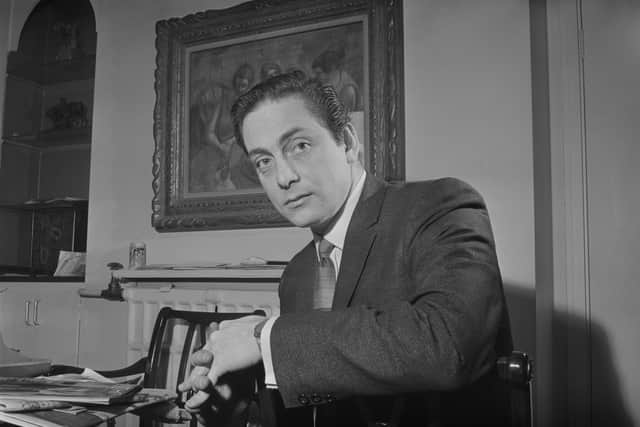Caligula: The Ultimate Cut | Why is Gore Vidal’s 1979 film so controversial and what is the “ultimate” cut?
and live on Freeview channel 276
It’s a film that cinema historians will long discuss with you in polarising fashion, but the Malcolm McDowell and Helen Mirren Roman epic, “Caligula” finally has been cut into what producers hope is the closest to writer Gore Vidal’s original vision.
“Caligula” has long been an oddity in cinematic history; despite its lavish backdrops and stunning cinematography at times, it’s also considered by many to be the worst film ever made, prompting critics to walk out of screenings and directors to disown the film after additional material was included.
Advertisement
Hide AdAdvertisement
Hide AdThere was also an embittered battle in getting the film into the United States, as the tale of the “mad” Emperor of Rome, Caligula, was deemed by some to be obscene to the point of breaking federal laws and several anti-pornography groups legally challenging against the screening of the film - not that it was going to have a widespread release if the MPAA had rated it.
The production marked an ugly moment for some of the casts and creatives involved and to this day remains one of those films that perhaps unintentionally revels in it’s excess; it had two different directors and still legal issues regarding whose vision is on screen and if that “vision” is indeed the one the creative intended?
“Caligula: The Ultimate Cut” may look to honour the original work Gore Vidal had intended to make its way onto the silver screen, but Tinto Brass isn’t happy that the new reconstructed film saw the light of date at the 2023 Cannes Film Festival.
What is “Caligula” about?
“The perversion behind imperial Rome, the epic story of Rome's mad Emperor. All the details of his cruel, bizarre reign are revealed right here: His unholy sexual passion for his sister, his marriage to Rome's most infamous prostitute, his fiendishly inventive means of disposing those who would oppose him, and more.”
Advertisement
Hide AdAdvertisement
Hide AdWhy has “Caligula” been so controversial since its release?
Should we start with the legal battles it faced trying to be released in the United States, or should we start with the controversial nature of the film itself?
The film did not shy away from the sex and violence that was Caligula’s reign as Emperor, with critics at the time comparing the work to pornography. Though there was ample skin in Gore Vidal’s original screenplay, producer Bob Guccione felt there needed to be a little more, so he "hired a skeleton crew, snuck back into the studios at night, raided the prop room" and shot a number of hardcore sex scenes to be edited into the film.
This didn’t sit well with the original director of the film, Tinto Brass, who upon discovering the new footage, which included Penthouse “pet” Anneka Di Lorenzo, disowned the film. In 1981, Di Lorenzo sued Guccione, claiming sexual harassment and finally being awarded by New York state court awarded her $60,000 in compensatory damages and $4 million in punitive damages in 1990. On appeal, the court vacated the award, ruling that punitive damages were not allowed by the law governing the case.
Upon trying to be released in the United States, producer Bob Guccione saw the film seized by customs officials, though Federal officials did not deem it to be obscene. Nonetheless, it didn’t lead Guccione to submit the work to the MPAA (the US equivalent of the BBFC) as he knew it would receive an “X” rating, meaning no cinema would carry it.
Advertisement
Hide AdAdvertisement
Hide AdInstead, the producer decided to hire out private cinemas and use the art-house circuit to promote the movie instead. That didn’t stop the barrage of poor reviews the work got, with the hallowed film critic Roger Ebert going as far as to call the film “sickening, utterly worthless, shameful trash. In the two hours of this film that I saw, there were no scenes of joy, natural pleasure, or good sensual cheer. There was, instead, a nauseating excursion into base and sad fantasies.” It would be one of the very few films the late Ebert walked out of before it finished.


Not that the content of the film was a concern to Bob Guccione; he was the founder of Penthouse magazine, who heavily promoted the film, leveraging its brand and existing audience to generate interest and anticipation for the release.
“Caligula” has long been considered one of the worst films ever made, but has also been heralded in contemporary reviews as a cult classic and an unabashed exercise in excess.
Why is this version considered the “ultimate” cut?
The new cut of the film by producer Thomas Negovan looks to follow closely the screenplay of Gore Vidal instead of that of Tinto Brass and Bob Guccione. The original unrated cut of the film is 154 minutes long, with the new reconstruction of the “Caligula,” including the use of 85 minutes of Brass’ workprint, now runs at 174 minutes.
When is “Caligula: The Ultimate Cut” released in the United Kingdom?
“Caligula: The Ultimate Cut” screens in selected theatres on March 8 2024.
Comment Guidelines
National World encourages reader discussion on our stories. User feedback, insights and back-and-forth exchanges add a rich layer of context to reporting. Please review our Community Guidelines before commenting.
